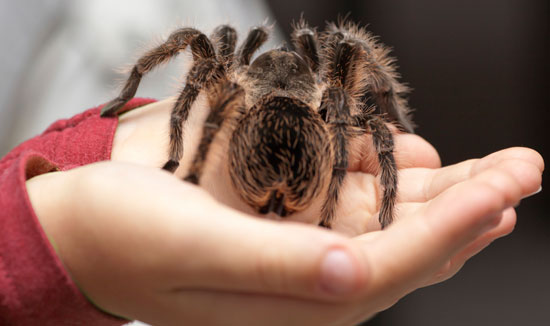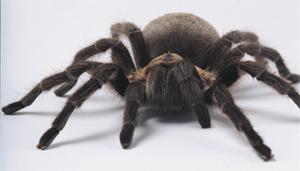How to Keep Spiders as Pets
Spiders can make fascinating pets. Here are a few steps to get you started keeping spiders.

Step 1: Catch a spider
Spiders are all around us, indoors and out, so they’re not hard to find. Some species can bite and a few are venomous. Learn about dangerous spiders in your area before heading out. It’s easy to safely catch a spider by using a small jar. Gently coax it into the jar using the lid. Spiders will eat each other, so keep only one per jar.
Step 2: Prepare a cage
Large spiders do well in the inexpensive plastic terrariums available from pet stores. Smaller ones can be kept in jars or plastic containers if air holes are drilled into the lid or sides. Be sure the holes are small enough to prevent escape.
Potting soil makes good cover for the cage bottom. Sticks, dead leaves or artificial plants provide structure for hiding, climbing and webbing.
Step 3: Water
Depending on the size of the spider, anything from a plastic bottle cap to a small bowl can serve as a water dish. Spiders also drink water sprayed on webbing, but you should never allow the cage to become damp.
Step 4: Feeding
Offer insect prey once or twice a week. Crickets are available from pet shops, or you can collect insects outdoors if no insecticides have been sprayed in the area.
Step 5: Observing
Watch your spider and take notes on its behavior. You won’t believe what happens in the spider’s web until you’ve visited it yourself!
PREFERRED PETS
 Not all spiders do well in captivity. Active hunters are usually easier to keep than web builders. Here are a few that make good pets.
Not all spiders do well in captivity. Active hunters are usually easier to keep than web builders. Here are a few that make good pets.
Tarantulas: Some species exceed 10 inches in legspan. They’re by far the most popular pet spiders and can be bought in pet stores.
Wolf Spiders: Some can be more than three inches in legspan. Large specimens do best in terrariums with lots of floor space.
Jumping Spiders: Although small and rarely exceeding half an inch, their jumping ability is amazing. Many species are brightly colored and can easily be kept in jars.
Fishing Spiders: In captivity, these large spiders appreciate vertically arranged pieces of bark for climbing. They’re very fast, so use caution when capturing them.
Grass Spiders: These spiders build funnel-shaped webs in grass, bushes and on buildings. In captivity, they will build extensive webs inside their cage.
LEARN MORE: Click here to see photos of a spider expert’s seven favorite spiders
Interesting. Heh heh, my sister would FREAK if I tryed this. P.S. My sister is aracnafobic (that means scared of spiders!)
i can cach daddy longlegs with my hands! 😉
hey they’re venomous
Yeah but their fangs can’t get through human skin, unlike Black Widows or Brown Recluses. Don’t let them walk over an open wound and you’ll be peachy.
MythBusters tried this Adam was bitten twice with his arm in a large tube of spiders and he was fine the bites were tiny.
i have a spider and i just dicovered this website it has became very helpful.
i didn’t know you can do that 😮
neither
We have a beautiful stitching spider, aka writer, in front of a window on the south side of the house. Haven’t had a frost yet, we rescued her from the neighbors yard where we know she would have been killed. She has layed 3 egg sacs! We would like to take her inside for the winter, is that possible? Would she live? Please hurry with answer the nights are getting gradually colder.
did you ever save it ? and if you did do you feed live or dead prey?
No we didn’t. Read up and found out they like natural sunlight and bigger spaces. Decided not to confine her. She did leave us 4 egg sacs before going though. Hopefully will have plenty next year to enjoy in the yard. Neighbors think I’m weird but it’s okay.
i just got a grass spider yesterday and she/he has only built the tunnel part of her web. how long does it take for them to build their webs.
uhm if u have an Orb-Weaver where would you keep it?? i kept it in a box with opn holes And with lock for safety that my Black widow is safe =)
Black widows love dark small places so it should be ok but diffrent speders spin defrent sized webbs so if he looked cramp change to summit bigger nd more hostile 😀
I have four jumping spiders, two are small and two are quite big (6mm). Because two of them are bigger, they always eat the flies and moths i put in their container, and the other small ones get hungry. should i let the small spiders go?
yes you shod let the letole juping spider’s go out
Dear caketin,
I’d let the little ones go. Right now they are proabably starving to death.
i look after and feed a spider on my landing, it lives on its web and just throw in moths or any insects tht fly in when i leave the windo open, i haave had it about 3 months and its getting big, i dont no wat spider it is thoo, it has a massive back compard to its body its brown with white dots on its back, and i live in the uk, any ideas on wat spider it is
It’s an ordanary house spider. And try to tear off the moths wings… as it can cause deficiency in some off its sences 😀
I have a male Phidippus apacheanus jumping spider. (red body, black legs) any tips on care?